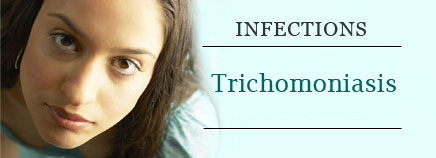
Trichomoniasis, one of the most common sexually transmitted diseases (STDs), is caused by a parasite called trichomonas vaginalis. This parasite can live in the urogenital tract of males and females and infect any sexually active person, especially those who are not using protection or who have multiple partners.

Trichomoniasis (often referred to as “trich” — pronounced “trick”) is usually treated with prescription medication. An infection can be uncomfortable and can make someone who has it more susceptible to human immunodeficiency virus (HIV), the virus that causes acquired immune deficiency syndrome (AIDS).
The only way for anyone to completely prevent infection is to abstain from sex. It’s important for sexually active teens to understand the importance of always using condoms, which can help protect against trichomoniasis and other STDs.
Symptoms
Symptoms of trich can appear as early as 5 days after sex with an infected partner. But trichomoniasis often goes undiagnosed because symptoms may not appear until later, if at all.
In females, symptoms can include:
- abundant or frothy vaginal discharge ranging in color from gray to green to yellow, with a watery to milky consistency
- foul smelling vaginal discharge
- itching and tenderness in or around the vagina
- pain during sex
- bleeding after sex
- pain during urination
- soreness or itching of the labia and inner thighs
- swollen labia
If you have a teenage daughter, it’s important for her to recognize both a normal vaginal discharge (it’s usually clear or whitish, has no bad odor, and causes no irritation) and one that might signal a problem.
Males who have trichomoniasis often don’t show any symptoms. But if they do, symptoms can include:
- mild urethral itching
- mild burning after urination or ejaculation
- painful or difficult urination
- inflammation of the prostate gland
- pain and inflammation of the scrotum
Prevention

Because trichomoniasis is an STD spread through sexual contact, the best way to prevent it is to abstain from having sex. Sexual contact with more than one partner or with someone who has more than one partner increases the risk of contracting any STD.
When properly and consistently used, condoms decrease the risk of STDs. Latex condoms provide greater protection than natural-membrane condoms. The female condom, made of polyurethane, is also considered effective against STDs.
Using douche can actually increase a female’s risk of contracting STDs because it can change the natural flora of the vagina and may flush bacteria higher into the genital tract.
A teen who is being treated for trichomoniasis also should be tested for other STDs, and should have time alone with the doctor to openly discuss issues like sexual activity. Not all teens will be comfortable talking with parents about these issues. But it’s important to encourage them to talk to a trusted adult who can provide the facts.
Treatment
The doctor can determine whether there is a trichomoniasis infection by performing a pelvic or genital examination and by testing a sample of vaginal or urethral discharge. In females, the infection also may be detected on a Pap smear.
Trich can be treated with prescription medications. Both sexual partners should be considered infected and treated at the same time, even if one has no symptoms.
Because many STDs might not cause obvious symptoms, teens often don’t know when they’re infected. It’s important for all teens who have had sex to get screened regularly for STDs so that they don’t lead to other more serious health problems.
Getting Help
If your teen is thinking of becoming sexually active or already has started having sex, it’s important to talk about it. Make sure your teen knows how STDs can be spread (during anal, oral, or vaginal sex) and that these infections often don’t have symptoms, so a partner might have an STD without knowing it.
It can be difficult to talk about STDs, but just as with any other medical issue, teens need this information to stay safe and healthy. Provide the facts, and let your child know where you stand.
It’s also important that all teens have regular full physical exams — which can include screening for STDs. Your teen may want to see a gynecologist or a specialist in adolescent medicine to talk about sexual health issues. Community health organizations and sexual counseling centers in your local area also may be able to offer some guidance.

